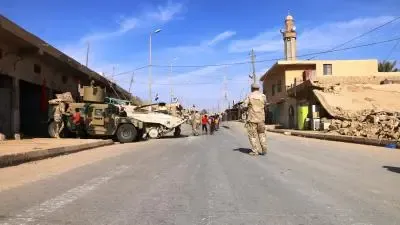Were Three Senior IS Militants Killed in Iraq?

Synopsis
Key Takeaways
- Iraqi forces killed three senior IS militants in Kirkuk.
- The operation was based on intelligence reports.
- IS remnants still pose a threat despite losing territorial control.
- IS originated from al-Qaeda and other insurgent groups.
- Ongoing violence and instability remain challenges for Iraq.
Baghdad, June 29 (NationPress) In a significant operation conducted by Iraqi security forces, three high-ranking militants affiliated with the Islamic State (IS) were eliminated in northern Iraq, as reported by the Iraqi Counter-Terrorism Service.
Following intelligence-gathering activities, the counter-terrorism unit executed an ambush targeting the militants in the Kirkuk province. The statement did not specify their precise coordinates within the province, according to Xinhua news agency.
Among those killed, two were identified as sector commanders, and the third held the rank of battalion commander in the Kirkuk area.
The counter-terrorism service emphasized its ongoing commitment to dismantling the remaining terrorist elements within Iraq.
Although Iraq proclaimed victory over IS in 2017, the group’s remnants persist in launching attacks against both security forces and civilians across urban landscapes, deserts, and isolated territories.
IS originated from the remnants of al-Qaeda in Iraq and other Sunni insurgent factions. By 2014, it had seized control of key cities such as Fallujah and Mosul, along with vast portions of the Anbar province.
In 2014, the group proclaimed a global caliphate, asserting religious and political dominion over all Muslims—a claim that was largely dismissed.
Following intense combat and military interventions by Iraqi forces and the Global Coalition, IS lost most of its territorial claims in Iraq and Syria by 2017 and 2019.
Despite the loss of its territorial stronghold, IS continues to function as an insurgency, executing attacks and employing guerrilla warfare strategies within Iraq and Syria.
Even in the absence of a caliphate, IS remains a formidable threat, with thousands of fighters still operational and actively destabilizing the region.
Current Situation in Iraq:
IS persists in conducting assaults against Iraqi security personnel and civilians, utilizing bombings, ambushes, and various forms of violence.
The group capitalizes on the prevailing instability and security voids, particularly in remote regions and along the Syrian-Iraqi border.










